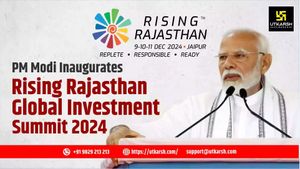NATO Chief Mark Rutte has recently issued a stark warning to European nations, urging them to ramp up their defense spending dramatically. Speaking at his first major speech since taking office as NATO Secretary-General, Rutte emphasized the pressing need to prepare for potential conflicts, particularly with Russia, which is perceived as a growing threat.
Presenting his address from Brussels, Rutte stated, "We are not ready for what is coming our way in four to five years." He painted a grim picture of the current geopolitical climate, declaring, "Danger is moving toward us at full speed." His comments highlight the increased urgency among NATO members to strengthen their military capabilities, especially in the wake of Russia's sustained aggression against Ukraine.
According to Rutte, Russia is gearing up for what he termed as a "long-term confrontation"—not just with Ukraine but also with NATO itself. "What is happening in Ukraine could happen here, too," he warned, signaling the grave consequences of underestimations about Russian ambitions. Although he clarified there's no immediate military threat, he insisted on the need for NATO to adopt a stronger and more proactive stance to deter possible conflicts.
Following Russia's invasion of Ukraine, NATO countries have been compelled to bolster their defense strategies, yet even after raising their budgets, they still fall short compared to Moscow's military production capabilities. Rutte underscored the substantial human costs of the conflict, estimating the toll at over one million casualties since the war's outburst. "Every day, this war causes more devastation and death. Every week, there are over 10,000 killed or wounded on all sides in Ukraine," he remarked, underlining the urgency for NATO to act decisively.
Last year, NATO established a defense spending guideline of two percent of each member's gross domestic product (GDP). Although it is expected 23 out of the 32 member nations will reach this target this year, Rutte conveyed his views on the necessity for increased spending, stating, "I can tell you, we are going to need a lot more than two percent." This call for higher defense budgets resonates against the backdrop of upcoming geopolitical challenges posed by nations such as Russia, China, and North Korea.
Rutte criticized the lack of preparation among NATO countries, underscoring the sacrifices needed to secure peace for the future. "If we don't spend more together now to prevent war, we will pay a much, much, much higher price later to fight it," he cautioned. His comments echo sentiments conveyed by former President Donald Trump, who previously urged NATO allies to boost their defense expenditures to maintain U.S. support. Trump's suggestions hinted at raising the target even higher, potentially to three percent of GDP.
Despite these calls for action, increasing military budgets is no small feat, particularly for major European economies like Spain and Italy, which remain under the set two percent threshold. Rutte reflected on historical spending trends, noting, "During the Cold War, Europeans spent far more than three percent of their GDP on defense. With the same mentality, we won the Cold War." His assertion makes it clear he believes Europe must adopt similar strategies to combat modern threats.
Rutte's address also incorporated suggestions on how NATO must operate collectively to revitalize its military capabilities. He urged member nations to forge more cohesive partnerships, emphasizing the importance of placing larger orders and long-term contracts for defense supplies. Acknowledging the fragmented nature of Europe's defense industry, he stated, "We are not where we want to be. Russia and China are racing ahead. We risk lagging behind. This is very dangerous."
To combat potential threats effectively, Rutte mentioned the need for innovation and risk-taking within the defense sector. "Industry needs to dare to innovate and take risks," he said, highlighting the necessity for increased production capabilities to meet the challenges posed by adversaries. He called for industries to work harder and more collaboratively, stating, "We need to put additional shifts and production lines. The current structure is too small, fragmented, and slow."
Rutte’s emphatic address marks a significant moment for NATO, signaling not just the need for heightened military readiness, but also for allies to unite under the common cause of preserving peace and security. Despite the challenges, he remains optimistic, urging the citizens of NATO countries to voice their support for these necessary sacrifices to guarantee enduring protection. "You accept to make sacrifices today so everyone can remain safe tomorrow," he concluded, leaving echoes of determination to prompt immediate action among NATO allies and citizens alike.



